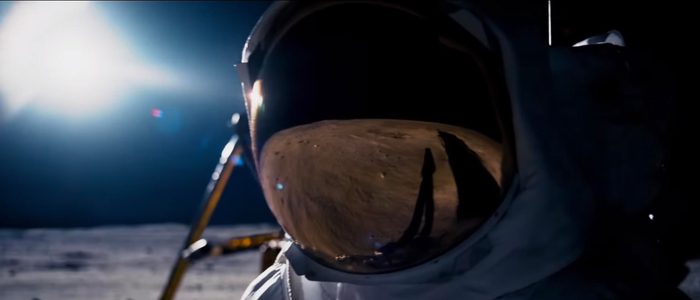'First Man' Is An Old Fashioned Drama That Never Fully Takes Flight [TIFF]
Damien Chazelle's Neil Armstrong biopic First Man features exciting sequences and wonderful performances from Ryan Gosling and Claire Foy. But this space adventure never really gets off the ground.
What do you know about Neil Armstrong? I'm positive the number one answer to this question, for virtually anyone, is: "He's the first man to set foot on the moon." But what do you really know about him? While watching First Man, it occurred to me that I knew almost nothing about one of the most famous men in the history of the world, and I'm sure I'm not the only one. That gives Damien Chazelle's new Armstrong biopic an advantage – here's the story you never learned about the man you never really knew.
Armstrong was notoriously guarded in real life, and only agreed to participate in one biography based on his exploits – First Man: The Life of Neil A. Armstrong, by James R. Hansen. Hansen's book serves as the launch pad for Chazelle's film, with Spotlight screenwriter Josh Singer filling in the gaps. As told by First Man, Armstrong was a man wracked with quiet grief. The story kicks off as Armstrong (Ryan Gosling) and his wife Janet (Claire Foy) suffer the loss of their 2-year-old daughter, who succumbs to a brain tumor. We see Armstrong pouring over cancer research, taking meticulous, scientific logs of his daughter's treatments. And then, she's gone – lowered into the earth in a tiny coffin. Armstrong quietly puts his log books away, and then breaks down in wracking sobs. It's the last real sign of outward emotion he'll show for almost the entire film.
From here, Armstrong joins the Gemini program, which will eventually pave the way for the Apollo program, which will eventually land him on the moon. But before he can get to that lunar surface, he has to go through a series of terrifying, death-courting missions that take him further and further into space. First Man is committed to reminding its audience just how downright terrifying and deadly all this was, and Chazelle stages one anxiety-inducing sequence after another – the tiny tin-can capsules Armstrong and company are blasting off in shake rattle and roll (those easily susceptible to motion sickness should brace themselves).
Through it all, Armstrong remains haunted by not just the death of his daughter, but also the deaths of his fellow astronauts. One after another, people come into Armstrong's life, only to die in some terrible accident. Death is a practically a supporting character in this film. It's a fascinating approach to Armstrong as a character – he never externalizes his thoughts on death and grief, but Chazelle finds ways to portray them all the same. Gosling does a great job conveying all this, using a quiet, measured way of speaking. Even when he's angry he holds it all in, the fire quietly simmering behind his eyes.
All of this is great, as is Claire Foy as Armstrong's long suffering wife, desperate for her husband to just reach out and share his emotions. And yet, First Man is oddly listless. Chazelle is taking an old fashioned storytelling approach here, but it backfires and renders much of the film inert. The frequent deadly trips serve to shake things up, but in between, there's an inertia that seems misplaced in a film all about slipping the surly bonds of earth. Chazelle's curious directorial decision to shoot almost the entire film in extreme close-up doesn't help. Perhaps the director was going for a more intimate, claustrophobic feel, but the end result is distracting. We spend so much time glued to Gosling and Foy's faces that we start to wonder what the heck is going out outside the frame.
Just when I was ready to write First Man off, the film finally gets to the moon landing, and what a sight it is. This extended sequence (see it in IMAX if you can, please) is stunning, and worth the price of admission alone. The whole film has been building towards this, and even though we know exactly what's going to happen, it's hard not to watch with baited breath. Spoiler alert: Neil Armstrong walks on the moon. Chazelle stages this with cuts back and forth between point-of-view shots, putting us literally inside Armstrong's helmet, and shots of the astronaut strolling across the vast, dead lunar surface, the sky pitch-black in the background. Singer's script then brings it all back home with a heartbreaking moment where Armstrong confronts his daughter's death for the first time in years. It recasts the entire historical event – and Armstrong – in an entirely new light.
Since the moon landing comes at the tail end of the film, it will likely be the thing that sticks with most viewers, and in essence makes First Man a memorable film. It's a pity most of the material before it fails to reach such lofty heights.
/Film rating: 7 out of 10

